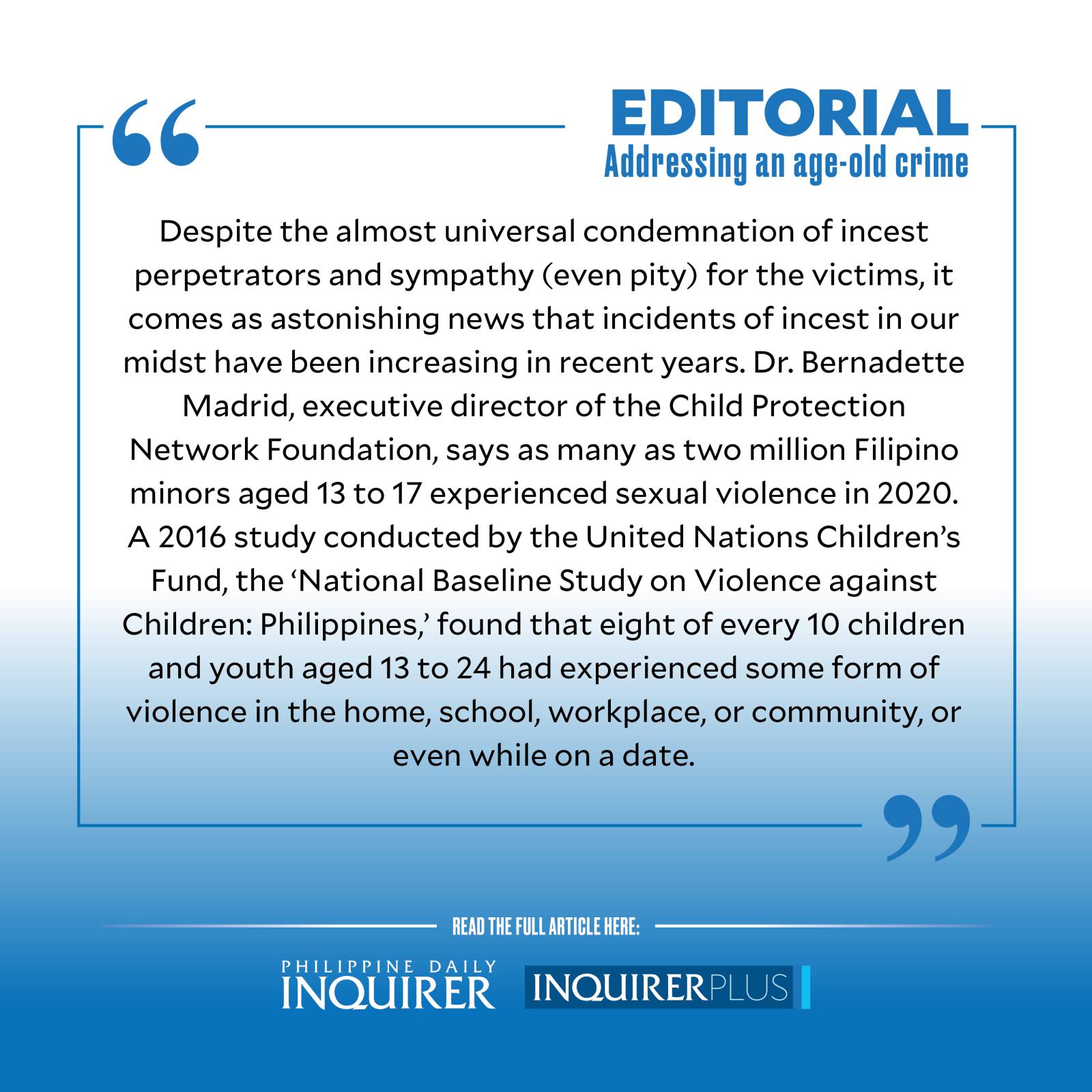
“Incest” is a word so fraught with fear, apprehension, anxiety, and loathing that it often provokes a visceral reaction.
And yet, despite the almost universal condemnation of incest perpetrators and sympathy (even pity) for the victims, it comes as astonishing news that incidents of incest in our midst have been increasing in recent years. Dr. Bernadette Madrid, executive director of the Child Protection Network Foundation, says as many as two million Filipino minors aged 13 to 17 experienced sexual violence in 2020. A 2016 study conducted by the United Nations Children’s Fund, the “National Baseline Study on Violence against Children: Philippines,” found that eight of every 10 children and youth aged 13 to 24 had experienced some form of violence in the home, school, workplace, or community, or even while on a date.
The truly awful news is that, according to Madrid, “while many of the perpetrators were strangers and friends to the child, the majority of them were family members—brothers, fathers, uncles, cousins, and even female perpetrators like mothers and sisters.”
Clearly, the family home is proving to be an unsafe place, a locus for danger and abuse, for children and young people. One must wonder why an offense so reprehensible as incest continues to victimize the most vulnerable members of society in ever-increasing numbers.
Justice Secretary Jesus Crispin Remulla offers up at least a partial explanation. This is because, he said back in February, many complainants, especially their families, opted to resolve the cases of incestuous rape and child abuse through an amicable settlement. Remulla said the Department of Justice (DOJ) would ask the Supreme Court to draft guidelines for lower courts to remove amicable settlement in resolving cases of incestuous rape and child abuse. “We should really treat [these cases] differently. We’re in an emergency, a state of emergency, when it comes to child sexual abuse,” he declared.
Remulla said the DOJ will also ask other government agencies that they should not use settlements in these cases, noting that these will only lead to repeat violations. “Our attitude on these cases should be nonnegotiable.’’
Incest and child sexual abuse have even found new outlets for expression and exposure. Madrid referred to another study by the United States National Center for Missing and Exploited Children that showed that cases of online sexual abuse and exploitation were increasing by “265 percent” here during the pandemic, compared to before the health crisis. Often, the use of online exposure for the sexual exploitation of children is perpetrated by their own parents or other influential adults. Alarmingly, there are international networks that thrive on the spread of sexual content involving children. At times, parents themselves initiate the sexual behavior, all the more to profit from this unseemly trade.
It turns out that repressing and burying the memory of abuse is a common tactic employed by adults, including family members, in response to a child’s story of abuse. “If the perpetrator is a relative and the child told [another] relative about it, the usual response is not to report to the authorities, to even tell the child to ‘just keep this a secret [because] this is embarrassing to the family.’” Adult survivors of incest also testify to trusting a parent or adult relative about the abuse only to be harshly rebuffed, scolded for “making up stories,” and even convinced that their stories were all in their minds.
But, as many therapists attest, memories of incest are not so easily erased. Childhood trauma often surfaces at the most unexpected moments, unprovoked, and maybe even repressed. Its effects are lifelong, and without therapy can hamper an individual’s ability to trust others, color perceptions of healthy sexuality and relationships, and worse, perpetuate the cycle by recreating the abuse a person underwent with one’s child or another young victim.
The best-known story of incest, indeed, the foundational seed for the almost-instinctive recoiling at the very idea, is that of Oedipus Rex, a tragedy by Greek dramatist Sophocles. As a boy, Oedipus is prophesied to kill his father Laius, and marry his mother Jocasta. Sent into exile, Oedipus as an adult becomes King of Thebes where by some cruel twist of fate, he ends up fulfilling the horrifying prophesy. When the truth is finally revealed, Jocasta kills herself and Oedipus pokes out his eyes and blinds himself, henceforth to live in exile.
But incest need not end in such tragedies. With the determination of government officials, such as Remulla, to reduce if not eradicate this crime, victims and even perpetrators can find their way toward resolving the deep-seated issues that give rise to it, as well as create an incest-free society.

